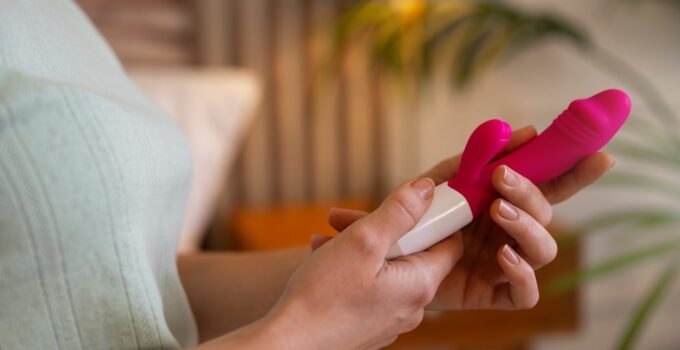It’s 2025. We live in an era where conversations around mental health, body positivity, and gender fluidity have come to the forefront. But for some reason, there’s still hesitation around discussing vibrators and other sexual products. Why is that? Why do we, as a society, still lower our voices or feel awkward when talking about vibrators?
People use vibrators for many reasons: self-care, exploration, or even enhancing intimacy with a partner. Yet, the stigma around discussing them openly remains. It’s time to break down those barriers. The benefits are clear, and there’s nothing shameful about taking control of your sexual health and pleasure.
Small But Powerful
For many, using a vibrator for the first time can feel intimidating. However, starting small is always an option. Mini wand vibrator, for example, is discreet and perfect for those who want a less intense introduction. It fits into the palm of your hand and is easy to store away. There’s no need for embarrassment or feeling awkward. It’s all about exploring what works for your body at your own pace.
These products have made exploring pleasure more accessible. Whether alone or with a partner, this compact option offers versatility without being overwhelming. The design is user-friendly, and its effectiveness speaks for itself. Why should anyone feel embarrassed about something so practical?
The Silence Surrounding Vibrators

Source: freepik.com
The hesitance to discuss vibrators may stem from a long-standing culture of shaming female pleasure. While society has become more open about sexual health for men, women’s needs have often been treated as taboo. This silence fosters misinformation and guilt, which can prevent people from fully understanding their bodies.
As children, many of us didn’t receive proper education on sexual health, let alone the role of vibrators. Instead, we learned from hushed conversations, or worse, not at all. The lack of honest, direct discussions keeps people in the dark about something that should be openly talked about. It’s not uncommon for people to try using toys and feel confused because they didn’t have the right information beforehand.
Wouldn’t it be refreshing if people could discuss their experiences with vibrators without fear of judgment?
Vibrators as a Tool for Wellness
Vibrators are not just about sexual pleasure. They can be a tool for wellness. Whether for stress relief, easing tension, or even helping with sleep, vibrators can offer more than just sexual satisfaction. Think of how a simple massage can relax sore muscles. Vibrators do something similar for intimate areas, bringing relaxation and relief.
More people now use vibrators as part of their self-care routines. It’s no longer just about the physical sensations, but about creating a safe, enjoyable experience that helps them connect with their bodies. People who use vibrators as part of their wellness routine often report feeling more in tune with themselves. They have a better understanding of what they like and what makes them feel good.
The Influence of Media on the Perception of Vibrators
Media plays a huge role in shaping public perception of vibrators. In movies, if someone pulls out a vibrator, it’s often portrayed as embarrassing or comedic. Vibrators aren’t shown as a normal, healthy part of life, but as something that’s slightly shameful. This kind of representation keeps the stigma alive.
When will we see vibrators represented for what they truly are—a way to enhance pleasure, wellness, and self-awareness? When will characters on TV casually discuss vibrators without a punchline attached? The more vibrators are normalized in media, the more people can feel comfortable talking about and using them.
Vibrators and Relationships

Source: freepik.com
There’s a misconception that vibrators are only for solo use. This couldn’t be further from the truth. Many couples integrate vibrators into their relationships to enhance their connection. The notion that a vibrator replaces a partner is outdated. Instead, it can add to the experience, creating new levels of intimacy.
Couples who use vibrators together often talk about increased communication in their relationship. When two people can openly discuss what brings them pleasure, it breaks down barriers. They learn more about each other’s desires, preferences, and needs. The vibrator isn’t a substitute but an addition. It opens up possibilities for deeper connections.
What’s Holding Us Back?
There’s no denying that we’ve made progress in talking about sexual health. But vibrators remain in the shadows. Why? Many point to the lingering effects of outdated beliefs, societal expectations, or religious teachings. For years, sexual pleasure was either demonized or not discussed at all, especially for women.
But times have changed. People want to know how to enhance their sexual health without feeling shame. If vibrators help with that, then why should there be silence? People should feel empowered to explore what works for them without judgment. Whether it’s for solo use or with a partner, vibrators are a normal part of many people’s lives. The sooner we start talking about that, the better.
Education is Key
For a long time, vibrators were excluded from sexual health education. Schools didn’t talk about them, parents didn’t talk about them, and so the cycle of silence continued. This lack of information led to misconceptions, discomfort, and even fear surrounding vibrators.
Changing this starts with proper education. Sexual health isn’t just about biology or preventing disease—it’s about understanding pleasure, intimacy, and wellness. People need to learn that using a vibrator isn’t something to be ashamed of. Vibrators are part of many people’s self-care routines, and knowing how to use them safely and effectively should be a priority.
Breaking the Cycle of Shame
The best way to break down the stigma surrounding vibrators is by starting conversations. The more people talk about vibrators openly and honestly, the more normalized they will become. Whether it’s through education, media, or personal conversations, opening the dialogue is crucial.
If someone uses a vibrator, they should be able to talk about it. There’s no shame in it. Every person has the right to explore what makes them feel good without guilt or embarrassment. The stigma around vibrators is outdated, and it’s time to move on.
Even something as simple as reading an article like this can make a difference. The more information we put out there, the more people will feel confident in their choices. It’s not about convincing anyone to use a vibrator if they don’t want to—it’s about letting those who do feel supported and understood.







